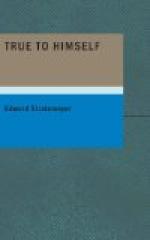“Yes, but, Roger—”
“By doing that you may be doing your father a greater service than in any other way. You say you will turn over a new leaf, and I hope you will. If all goes as it should you will have a hard trial to stand before long. But do as I did when things went wrong in our family, bear up under it, and if you do what’s right somebody is bound to respect you.”
And, without waiting for a reply, I caught up my hat and hurried from the room.
I found Mr. Harrison waiting for me in the parlor.
“I thought I’d come over early,” he explained. “I know young blood is impatient, and I half expected to find you gone.”
“I didn’t want to make a call before folks were up,” I answered. “Besides, I have made quite an important discovery since we parted.”
“Indeed.”
“Yes. Come away from this place and I’ll tell you. I don’t want to meet Duncan Woodward again.”
And as we walked away from the hotel I related the particulars about the note-book.
“You are gathering evidence by the wholesale,” laughed Mr. Harrison. “You’ll have more than enough to convict.”
“I don’t want to make a failure of it,” I said firmly. “When I go to court I want a clear case from start to finish.”
“Good! Strong, I admire your grit. Come in the restaurant, and while we have a bit of breakfast let us look over the papers. I declare, I was never before so interested in some one else’s affairs.”
And as we waited for our rolls, eggs, and coffee, we read the papers through carefully.
They gave much information, the most startling of which was that John Stumpy and Ferguson were one and the same person.
“That explains why Mr. Woodward made so many slips of the tongue when addressing him,” I said.
“Here is another important thing,” remarked Mr. Harrison; “a letter from this John Woodward stating that Mrs. Agatha Mitts knows of the forgeries. Now, if you can get this woman to testify against the two culprits, I think you will have a clear case.”
“And that is just what I will force her to do,” I said, with strong determination.
I could hardly wait to finish breakfast. Fortunately it did not take Mr. Harrison long to do so, and, five minutes later we were on our way to the ferry. The trip over the East River, near the big bridge, did not take long, and we soon stood on the opposite shore. Vannack Avenue was pretty well up town, and we took the elevated train to reach it.
“There is No. 648,” said Mr. Harrison, pointing to a neat three-story brick building that stood in the middle of the block; “let us walk past first, and see if there is any name on the door.”
We did so, and found a highly polished silver plate bearing the words:—
Mrs.
Agatha Mitts
Boarding
“Perhaps it would be a good plan to find out something about the woman before we call on her,” suggested my companion, after we had passed the house.




